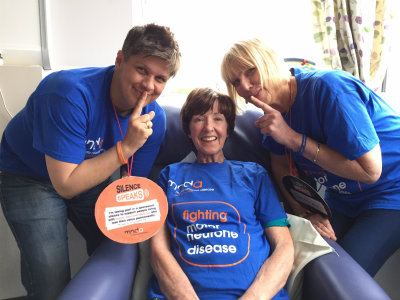
Maureen Carson has received a lifetime achievement award for her contribution to social work. Two years ago she was diagnosed with motor neurone disease and the illness led to her losing her speech.
Unable to communicate through speech, Maureen resigned from her job as an independent reviewing officer for looked after children with disabilities. She felt she could no longer chair the meetings without a voice. She now communicates via an iPad with a specialist predictive speech application.
This week, Lynn Baxter, Maureen’s best friend and a former social work colleague, and Sally Roberts, Maureen’s niece, are taking on a ‘silent challenge’. The week-long sponsored silence aims to raise awareness of the impact on individuals of losing your voice through motor neurone disease.
The duo will both only communicate through the same iPad technology that Maureen now relies on. They will also blog each day about their experience. The pair are raising funds for the Motor Neurone Disease association in south London.
MND EDIT from Sarah Mills on Vimeo.
Writing about the challenge, Lyn said: “I thought it was particularly cruel of the disease to steal her voice first, as Maureen has always been a very sociable person, an entertainer and full of laughter and stories to tell. In her career as a social worker she was a skilled communicator and she had helped many vulnerable children to speak out about their abuse and pain. She had also developed training and tools to help other professionals listen better to children and to ensure that children had a voice in plans for their futures.
“…Even with her iPad by her side, we are aware that Maureen’s loss of ‘normal’ speech daily causes her frustration, discrimination and insensitive treatment from the general public and professionals. This is usually from people who lack awareness of motor neurone disease, those who jump to assumptions about her lack of speech, or who are just plain stupid and don’t think. For example, the GP who phones her to discuss new medication, the shop assistant who shouts at her as if she’s deaf or speaks slowly as if she’s stupid, or the district nurse who talks about her as if she’s not there.”
You can read more about Lynn and Sally’s fundraising effort here.


 Bournemouth, Christchurch and Poole
Bournemouth, Christchurch and Poole  Hampshire County Council
Hampshire County Council  Lincolnshire County Council
Lincolnshire County Council  Norfolk County Council
Norfolk County Council  Northamptonshire Children’s Trust
Northamptonshire Children’s Trust  South Gloucestershire Council
South Gloucestershire Council  Wiltshire Council
Wiltshire Council  Wokingham Borough Council
Wokingham Borough Council  Children and young people with SEND are ‘valued and prioritised’ in Wiltshire, find inspectors
Children and young people with SEND are ‘valued and prioritised’ in Wiltshire, find inspectors  How specialist refugee teams benefit young people and social workers
How specialist refugee teams benefit young people and social workers  Podcast: returning to social work after becoming a first-time parent
Podcast: returning to social work after becoming a first-time parent  Podcast: would you work for an inadequate-rated service?
Podcast: would you work for an inadequate-rated service?  Family help: one local authority’s experience of the model
Family help: one local authority’s experience of the model  Workforce Insights – showcasing a selection of the sector’s top recruiters
Workforce Insights – showcasing a selection of the sector’s top recruiters 

 Facebook
Facebook X
X LinkedIn
LinkedIn Instagram
Instagram
Comments are closed.